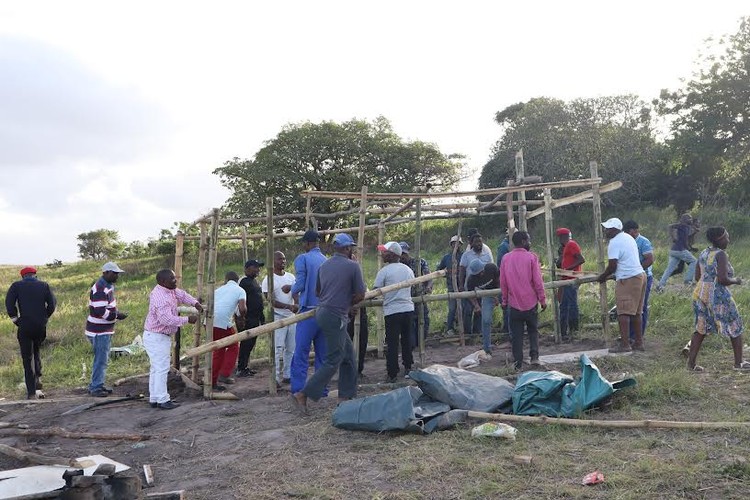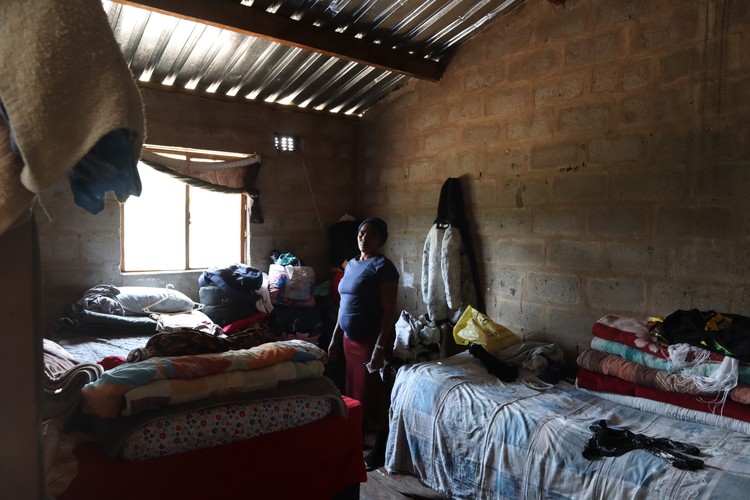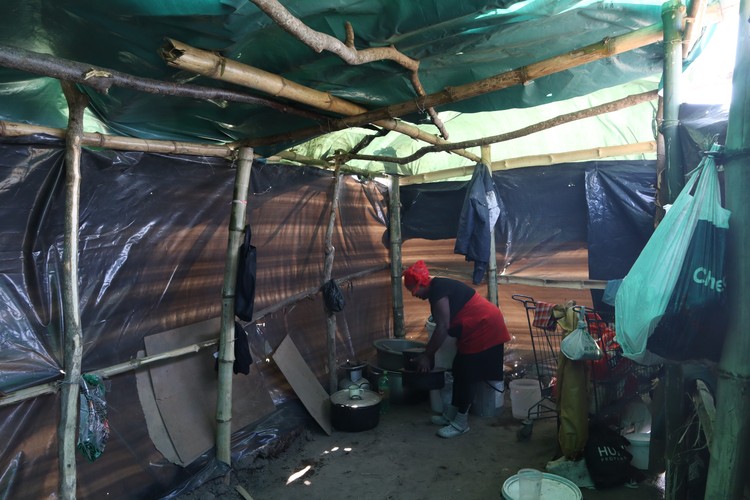Battle over land in KwaZulu-Natal
Since 2022, people have been trying to occupy land in Rocky Ridge in KwaDukuza
Families have been building shacks in Rocky Ridge, KwaDukuza, since 2022. Shacks are rebuilt quickly after being demolished. Photos: Joseph Bracken
- The KwaDukuza municipality has been battling to keep a group of people from occupying a plot of land above Shayamoya.
- They have rebuilt shacks on the land several times after having them torn down.
- The occupiers say they will keep building until they are allowed to stay on the land.
Families in KwaDukuza have been trying to build an informal settlement on municipal land for more than two years. The illegal occupation has led to a recurring battle between the municipality and the families, in which shacks are put up and then torn down.
The first attempt to set up an informal settlement began in mid-2022 when a large group of people started clearing foliage and planting structural poles on a patch of municipal-owned land, known formally as Rocky Ridge, which was demarcated for future mixed-use development, according to Collen Mdletshe, the councillor (ANC) for Ward 23 KwaDukuza.
The area is located above Shayamoya township. According to the property title deed, the KwaDukuza municipality purchased the land in 2020 for R44.9-million.
On 13 May 2022, the municipality was granted a court interdict allowing it to remove any structures built on the land. Land occupation attempts died out, but in early August 2024, a group returned to the site and began once again clearing the land and planting poles, according to community leader Xolani Malinga. This group, led by Malinga, would form the basis of the current ongoing occupation.
In early September the first completed shacks went up, but they were soon torn down by South African Police Service (SAPS) officers and guards from Pro Secure, a private security company tendered by KwaDukuza Municipality.
The most recent demolitions happened on 17 September and 30 October. Last week GroundUp reported that 50 structures had been destroyed and 400 people displaced. But images GroundUp has obtained from shortly before the incident showed only a few fully finished shacks.
According to Malinga, the municipality waits until people have built a few shacks before sending SAPS and Pro Secure to demolish them. On several occasions the officials have burnt the structures after tearing them down, said Malinga.
In one instance the occupiers claim that Pro Secure told them to build their shacks in a semi-forested area at the top of Rocky Ridge so they would be out of sight from the people that would report them. But Pro Secure came and tore the structures down soon after.
GroundUp made several attempts to contact Pro Secure. When our calls were not answered went to the company’s offices, but we were denied entry.
Malinga said the occupiers are not deterred by the repeated demolition of their shacks. “We won’t stop building,” he said. It is a way to prompt the municipality to provide them with housing, water and electricity, he said.
When GroundUp visited the site on 31 October, no shacks were left standing after the most recent demolitions, but by 3 November there were 10 finished shacks on the land and 11 more were being built.
To prevent future occupations on the site, it was proposed at the council meeting on 31 October that land owned by the municipality be leased out until funding is available for their development, said Sifiso Zulu, KwaDukuza local municipality spokesperson.
Broken promises
Malinga said the 2024 move onto the land began because people were angry that RDP housing had not been built on the Rocky Ridge land. In 2022 the council had promised people in Ward 23 that housing would be built in the area within the year, he said.
When no development took place this year, people decided to take matters into their own hands and started to build shacks. Malinga said that the occupiers are people from KwaDukuza who are living in poor conditions and want a way out.
About 400 people currently occupy the land, sleeping out in the open when the shacks are destroyed, said Malinga. But GroundUp visited the site daily from 31 October to 3 November, we counted about 70 people on the first day when the group was at its largest. On an evening visit on Friday, the number had dropped to about 20.
According to Malinga, the fluctuation in occupancy was due to people having to go to work and to Shayamoya to find a place to shower.
People GroundUp spoke to said they had moved onto the land because they had been renting overcrowded homes that they could no longer afford.
Samkelisiwe Msazane from Shayamoya said he and the others came to Rocky Ridge every day to put pressure on the government to build RDP houses. “I am relying on the child support grant so I can’t afford rent anymore. I have five children. I am paying R500 [in rent]. That is why I have decided to join the protest so that we can put pressure on the government.”
Themba Buthelezi said he was born in the area. He and his nine family members currently share a one-room house. Most of the people living in the area are not working or earn very little, he said. Only two people in his family work and together they earn less than R4,000 a month.
Daniel Shwalakhe said he arrived in KwaDukuza from the Eastern Cape in 1994. He lives off his pension and cannot afford to pay his R800 rent anymore. At 84 years old, Shwalakhe has never owned his own home, and he’s hoping the land occupation will change that.
Olwethu Bilitile, was sharing a two-room RDP house with nine family members. She sleeps on a mattress in the kitchen. No one in the house has work, she said.
“I lost my job during the Covid pandemic. That is why I cannot afford to even pay rent. I have my four children and my sister also has her own children. We are all relying on the government grant,” said Bilitile.
Olwethu Bilitile in one of the two rooms in the house she shares with nine of her family members. Bilitile usually sleeps on a mattress in the kitchen.
Malinga has set up a committee to organise the occupation. Soon after the 2024 occupation began in August the committee distributed unofficial RDP registration forms which families were urged to fill out and hand back to the committee. About 400 forms have been filled in.
Malinga said they want a record that they can eventually hand over to the municipality.
At the top of many of these forms are notes with numbers such as “R100” and “R50” and words such as “paid”. Malinga said these are donations for the well-being of the community that are deposited into a group bank account run by the committee.
But a local businessman who wanted to remain anonymous said the money is actually from selling plots of land demarcated by poles painted white with numbers on them. Malinga denied that any money was taken for plots and said members did not have to donate to join the group.
The money is for things such as food, medical bills and bail for those who get arrested for participating in the occupation, said Malinga. One person has been arrested so far and has yet to be charged, he said.
Every day people from the community cook food bought with the money collected by the committee.
The group also organised protests, recently by blocking a main road, and as a municipal road used by farmers, twice. Malinga said they did this as they knew it would get the municipality’s attention because they listen when farmers complain. The roads were blocked with various items such as burnt tyres and glass.
The businessman said some of the farmers had been threatened by the occupiers and did not want to get involved. He said they support the construction of RDP housing on the land but want to make sure that the municipality follows the correct protocol and makes sure the housing goes to the people who need it most.
Malinga denies that he or anyone else from the group has made any threats. He said they had talked to some of the farmers about how they are committed to a non-violent approach and were even in the process of starting a Community Protection Forum.
He said they hoped to join the Abahlali baseMjondolo movement to gain support. Malinga and his committee wear Abahlali baseMjondolo regalia at the Rocky Ridge site even though they are not yet members.
On Sunday about 60 people from the land occupation took four taxis to Durban to join Abahlali baseMjondolo members in a march. Malinga hopes that this will increase their chances of gaining membership.
The shacks have wooden frames and are covered in plastic.
According to Mdletshe, his council never promised the houses would be built within the year. His original statement was taken out of context in a community meeting in 2022, he stated.
In the meeting, Mdletshe said, he had stated that housing could be built but bulk water infrastructure was necessary. The KwaZulu-Natal Department of Human Settlements acknowledged the need for housing and agreed to more than 400 units in Rocky Ridge, on condition that the iLembe District municipality provide the bulk water infrastructure.
But the district municipality currently does not have the budget to do so, he said.
The iLembe District Municipality did not respond to GroundUp on the question of the bulk water issues.
Mdletshe said in September he had invited Malinga and his committee to bring people from the community to a meeting to discuss their issues, but they did not attend. Malinga said they could not attend because they were having their own meeting at Rocky Ridge at the time.
Mdletshe said his ward has become overcrowded and unemployment has risen, and that he understands the pain of his constituents and the need for housing. He said there is a communication breakdown between the Department of Water and Sanitation, iLembe, KwaDukuza and the Department of Human Settlements.
“As leaders, we need to do more to ensure that we influence all of these stakeholders to sit together,” Mdletshe said.
Support independent journalism
Donate using Payfast

Don't miss out on the latest news
We respect your privacy, and promise we won't spam you.
© 2024 GroundUp. This article is licensed under a Creative Commons Attribution-NoDerivatives 4.0 International License.
You may republish this article, so long as you credit the authors and GroundUp, and do not change the text. Please include a link back to the original article.
We put an invisible pixel in the article so that we can count traffic to republishers. All analytics tools are solely on our servers. We do not give our logs to any third party. Logs are deleted after two weeks. We do not use any IP address identifying information except to count regional traffic. We are solely interested in counting hits, not tracking users. If you republish, please do not delete the invisible pixel.



